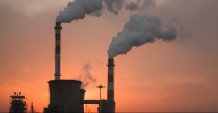Articles

Professor Betts said that of all the greenhouse gases, carbon dioxide was a particular concern, as it didn’t breakdown chemically and could stay in the atmosphere for centuries.
Top climate scientist tells Citizen's Assembly: 'We must act now to reduce carbon emissions'
The devastation inflicted on future generations and the environment if we don’t act to reduce carbon emissions now was laid bare at Devon’s Climate Assembly this week by one of the UK’s top climate scientists.
Professor Richard Betts MBE, of the Met Office and the University of Exeter, is a lead author on the Intergovernmental Panel on Climate Change and led the Technical Report for the UK’s 3rd Climate Change Risk Assessment.
He gave a sobering analysis on what would happen if countries didn’t achieve net-zero by the middle of this century - and global warming continued unchecked.
The presentation was part of the first weekend of the Devon Citizens Assembly – a vital part of the Devon Carbon Plan process.
The Carbon Plan is being developed by the Devon Climate Emergency Response Group, a partnership of councils, emergency services, voluntary organisations and business groups.
The group has set a target for Devon to be carbon-neutral (net-zero) by 2050 at the latest.
Hundreds have already contributed to the plan, however some of the issues that need to be solved are so significant that they need further discussion.
And it’s these issues that will be considered, discussed and voted on by the 75-member Assembly before being added to the Carbon Plan - a public consultation will then be held and the final Carbon Plan will be published and adopted next year.
Professor Betts said that of all the greenhouse gases, carbon dioxide was a particular concern, as it didn’t breakdown chemically and could stay in the atmosphere for centuries.
He said: “That’s why we need to stop emissions rapidly because we keep on adding to the problem. Even if we reduce emissions slowly, we are still putting more into the atmosphere.”
He added that as a species we had increased the levels of Co2 by 50 per cent since the pre-industrial era.
“We are now way outside what the earth has seen for 800,000 years, and in excess what our species (has ever) experienced.”
In the Paris Agreement, governments committed to keep global warming ‘well below 2°C’, and ‘make efforts’ to keep it below 1.5ºC’.
He explained why the assemblies’ work and the net-zero goal by 2050 was so important: “Sea levels are rising, and severe weather events are becoming more severe and more frequent.
“The flooding in southern England in 2014 was more severe because of climate change.
“The heatwave in 2018 was made 30 times more likely because of climate change and that lead to 863 deaths (in the UK) more than half of which were attributed to climate change.”
On our current trajectory his ‘best guess’ was that by the end of the century we would be nowhere near the 1.5°C target, and that 4°C was ‘easily quite possible.’
“As well as more flooding we can also expect less water availability…we would get more extreme rainfall but longer periods between rainfall.
“Water vapor is projected to reduce by up to 20 per cent with 2°C warming and 50 per cent with 4°C warming.”
He said that heat related deaths would also increase – currently there are approximately 2,000 every year in the UK.
That number could more than triple at 2°C and reach 13,000 at 4°C: “We would expect to see an increase of wildfire risk from 9% today…up to 26% at 2°C and 50 per cent with 4°C warning.
“If we are aiming for 1.5°C we need to cut global emissions rapidly to net-zero and stop putting more carbon into the atmosphere by the middle of this century.
“The reality is that it’s not happening. Globally many regions have been increasing emissions…and while the EU, UK and US have been gradually reducing emissions it’s by nowhere near enough.
“We’re (the UK) not on track to meet our own targets of net-zero by 2050.”
Professor Patrick Devine-Wright, of the University of Exeter’s Geography department and Global Systems Institute, lead author on the Intergovernmental Panel on Climate Change, and chairman of the net-zero task force, said: “This analysis is sobering – it sums up what will happen if we don’t do anything. In this scenario, lives and livelihoods will be lost, economies devastated, species extinct and some countries could even disappear under the waves.
“Although many of the solutions we are proposing require changes in national policy, and we need to continue to make our voices heard by government, other including our lifestyle choices, how we travel, the energy we use, the food we eat, we can all start doing now.
“There is hope - and in Devon we have a plan, but the message is that all of us, Devon residents, the UK Government and people all over the world must act now.”
A member of the Citizen’s Assembly, Ben Proctor, from Plymouth said: “Numbers like '2 °C' and '4°C’ don't really inspire dread or the need to act…it's never actually been explained to me why those numbers are so significant (until now).
“I was shocked - the heat death numbers were the ones that hit home. It's completely indiscriminate, so seeing that number was different to anything which 'might not happen to me' as much as I would like to say otherwise.
"It's that degree of separation between disasters and people unaffected by them.”
You can watch Prof. Betts' presentation HERE.
You can watch the other presentations so far HERE.
Date: 5 July 2021
